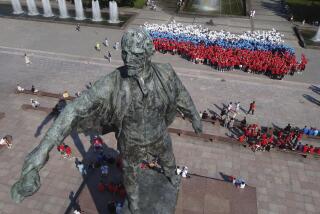Russia General in Chechnya Calls for Public Hangings
MOSCOW — The general commanding Russia’s military campaign against separatist Chechnya called Monday for the public hanging of Chechen rebels, remarks that reflected Russia’s growing frustration with the stalemated war.
“[Do they deserve] a life sentence?” Gen. Gennady Troshev said in an interview published in Monday’s Izvestia newspaper. “Under no circumstances! They deserve the most torturous death possible. This is how I’d do it: I’d gather them all in a square, string up a bandit and let him hang, let everyone see.”
Troshev’s comments drew broad condemnation from government and human rights officials. But the remarks also reflected a widespread frustration with the war’s intractability and the dearth of new ideas for ending it.
“We understand Troshev’s anger and indignation but believe that only the courts should pass sentence,” Justice Ministry spokesman Boris Kalyagin told the Interfax news agency.
Russia has been observing a moratorium on the death penalty in a bid to keep its membership in European human rights groups. Nonetheless, Troshev won praise from several parliament leaders, including some allied with the Kremlin.
“I support Troshev on the issue and think the death penalty should be applied, including in public, especially when it concerns terrorists,” said Gennady Raikov, leader of a pro-Kremlin faction.
Russian forces have made little progress in recent months against Chechen rebels, who are waging a stubborn “land mine war” that kills dozens of Russian servicemen every week. Last week, according to official reports, Chechen rebels carried out more than 140 hit-and-run attacks and Russian sappers defused 160 explosive devices.
There has been little change in the balance of power in more than a year. In January, command of the operation was transferred to the Federal Security Service, the main successor to the Soviet-era KGB, in an effort to demonstrate that the conflict was no longer a war but merely a security threat posed by isolated “terrorist” bands.
Nevertheless, the security forces have made little apparent headway, and military analysts say an announced withdrawal of federal forces was quietly halted a month ago.
Current rumors in Moscow are that control of the operation may be shifted yet again, this time to the Interior Ministry. Military analyst Pavel Felgenhauer says the rumors are a sign that members of the armed forces are maneuvering to escape blame for an impending defeat. And the commander’s remarks, he said, are a sign that Troshev is “losing his nerve.”
“The situation in the republic is dangerous and complex: The withdrawal of troops has been suspended, and everyone knows that Chechen fighters are plotting a large-scale military rebellion,” Felgenhauer said. “Naturally, Troshev is nervous, because if that rebellion occurs, Troshev will be personally held responsible for having allowed it.”
Last month, the Kremlin’s chief spokesman concerning the separatist republic, Sergei V. Yastrzhembsky, said the number of Russian military fatalities in the latest Chechen conflict had topped 3,000. And in a public hearing in parliament Monday, the Kremlin’s human rights representative for Chechnya, Vladimir A. Kalamanov, acknowledged that his staff has documented 546 cases in which Chechens have gone missing, mostly after being detained by federal forces.
“The number of reports [of missing people] increases sharply after so-called mopping-up operations and passport checks, because many checks have been carried out without the participation of representatives of the prosecutor’s office or local administration . . . and often without apparent reason,” Kalamanov said.
Russian officials have repeatedly announced new kinds of operations to break the stalemate. have proved dangerous or impractical.
Meanwhile, the number of Russians who support the war continues to erode. Although Russians backed the operation overwhelmingly when it began two years ago, in recent months opinion surveys show that the percentage of those who favor peace talks has quietly passed those who support continued hostilities. There have even been timid antiwar rallies in Moscow and Chechnya.
“As long as hostilities go on, Russia will continue to lose its citizens--both servicemen and civilian residents of Chechnya,” Valentina D. Melnikova, chairwoman of the Soldiers’ Mothers Committee, told parliament. “And it is only the political will of our president that can put an end to this flood of disappearances.”
Russia’s most prominent human rights campaigner, parliament deputy Sergei Kovalyov, said Troshev’s continued command of the forces in Chechnya is a sign that the Kremlin has neither the will nor the vision to end the conflict.
“I do not hold it against Gen. Troshev personally. He is a cruel, unintelligent, hysterical person,” Kovalyov said. “I hold it against the authorities in Moscow. How come this man still holds key positions in the North Caucasus?”
More to Read
Sign up for Essential California
The most important California stories and recommendations in your inbox every morning.
You may occasionally receive promotional content from the Los Angeles Times.










